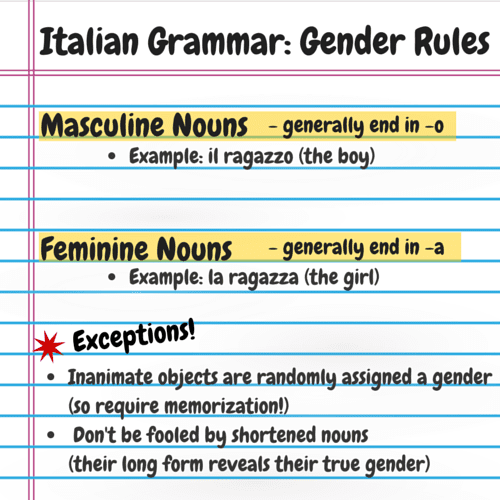ITALIAN NOUNS AND GENDERS
Most Italian nouns end in a vowel—those that end in a consonant are of foreign origin—and all nouns have a gender, even those that refer to a qualities, ideas, and things. Usually, Italian singular masculine nouns end in –o, while feminine nouns end in –a(-tà).

| » Masculine |
» Feminine |
| Tavolo (table) |
Casa (house) |
| Sviluppo (development) |
Rosa (rouse) |
| Organismo (organism) |
Città (city) |
There are exceptions for this rule, of course (see table below):
| » Masculine |
» Feminine |
| Giornale (newspaper) |
F rase (sentence) |
| Pane (bread) |
Canzone (song) |
| Nome (name) |
Notte (night) |
Gender Inflections for Nouns:
- Feminine is often obtained from masculine by the alternation -o : -a in the endings
| » Masculine |
» Feminine |
| Amico friend |
Amica friend |
| Bambino little boy |
Bambina little girl |
| Cugino cousin (he) |
Cugina cousin (she) |
| Figlio son |
Figlia daughter |
| Maestro master, teacher |
Maestra teacher (female) |
The alteration
-e : -a also occurs,
cf.:
| » Masculine |
» Feminine |
| Signore mister |
Signora mistress |
| Padrone master, owner |
Padrona mistress of the house |
- Sometimes masculine and feminine are derived from different (or modified) roots:
| » Masculine |
» Feminine |
| frate friar |
soura nun |
| fratello brother |
sorella sister |
| padre father |
madre mother |
| uomo man |
donna woman |
| paperone drake |
oca duck |
- These are nouns with one form for both genders. Here are included all the nouns suffixed by -ista. Examples:
- Artista » artist
- Giornalista » journalist
- Pianista » pianist
- Turista » tourist etc
| » camerata comrade |
» consorte consort |
| » compatriota compatriot |
» amante lover |
| » eresiarca heresiarch |
» cliente client |
| » idiota idiot |
» commerciante trader |
| » omicida murderer |
» interprete interpreter |
]]>

